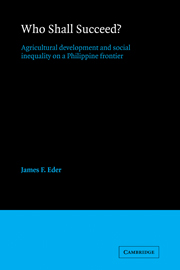Book contents
- Frontmatter
- Contents
- List of tables, figures, and maps
- Preface
- 1 Introduction
- 2 Rich man, poor man: life in a frontier farming community
- 3 The economic and social origins of the migrant farmers
- 4 Eight migrants
- 5 The origins of social inequality
- 6 The maintenance of social inequality: earning a living
- 7 The maintenance of social inequality: earning prestige
- 8 The perpetuation of social inequality?
- 9 Conclusion
- Appendixes
- Notes
- Bibliography
- Index
- Frontmatter
- Contents
- List of tables, figures, and maps
- Preface
- 1 Introduction
- 2 Rich man, poor man: life in a frontier farming community
- 3 The economic and social origins of the migrant farmers
- 4 Eight migrants
- 5 The origins of social inequality
- 6 The maintenance of social inequality: earning a living
- 7 The maintenance of social inequality: earning prestige
- 8 The perpetuation of social inequality?
- 9 Conclusion
- Appendixes
- Notes
- Bibliography
- Index
Summary
This book records a dramatic and unique event in the lifetime of a single community: the emergence and institutionalization of social inequality. It concerns the settlement and growth of San Jose, a pioneer farming village located on the east coast of Palawan Island, the Philippines. San Jose is one of many such villages founded during the 1930s and 1940s by migrant swidden farmers from Cuyo Island, 300 kilometers distant (Map 1.1). First by sailboat and later by motor launch, these migrant “Cuyonons” left an isolated and over-populated homeland to seek a new life on a largely uninhabited but potentially prosperous island that shares with Mindanao the distinction of being the nation's last frontier. During their early years on Palawan, those migrants who settled in San Jose were preoccupied with shifting cultivation of upland rice and with clearing the virgin forest from their homesteads. Their lives were subsistence oriented in a culturally homogeneous social order that was only marginally linked to the market economy.
Today, San Jose is a fully occupied community with numerous links to external socioeconomic systems. Its residents, responding to the market opportunities created by rapid postwar population growth in nearby Puerto Princesa City, specialize in the production of fruits, vegetables, and livestock for sale in the town marketplace. Favored by geographical location and a high level of return for their farm output, they enjoy rising incomes and standards of living.
- Type
- Chapter
- Information
- Who Shall Succeed?Agricultural Development and Social Inequality on a Philippine Frontier, pp. 1 - 7Publisher: Cambridge University PressPrint publication year: 1982



